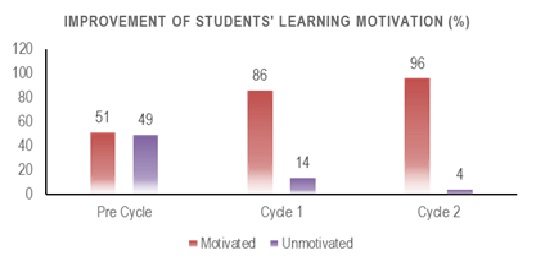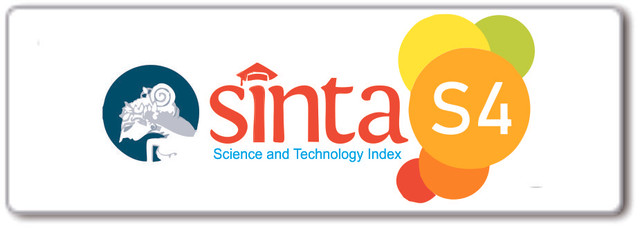Integrating Culturally Responsive Teaching and Role-Playing to Enhance Biology Learning Motivation
Abstract
This classroom action research was conducted in 2024 at SMA Negeri 42 Maluku Tengah, specifically in grade X Biology, focusing on the Plantae topic. The study was motivated by the low student engagement and learning outcomes, which were evident from several factors, including lack of enthusiasm during lessons, minimal participation in learning activities, the perceived irrelevance of the material to daily life, and overall poor academic performance. To address these issues, a combination of the Culturally Responsive Teaching (CRT) approach and the Role Playing model was implemented. This strategy aimed to enhance students' comprehension by connecting the material to real-world experiences, thereby improving their academic performance. Conducted in two cycles, the study revealed a significant improvement, with student motivation reaching 98% and learning outcomes achieving 100%. Students with higher motivation demonstrated better academic results as they were actively engaged in the learning process and could relate the material to their everyday experiences. The findings suggest that integrating the Culturally Responsive Teaching (CRT) approach with the Role Playing model effectively enhances student motivation and learning outcomes in Biology, particularly in the Plantae topic.
Downloads
References
Alhanachi, S., De Meijer, L. A. L., & Severiens, S. E. (2021). Improving culturally responsive teaching through professional learning communities: A qualitative study in Dutch pre-vocational schools. International Journal of Educational Research, 105, 101698. https://doi.org/10.1016/j.ijer.2020.101698.
Andriani, R., & Rasto, R. (2019). Motivasi belajar sebagai determinan hasil belajar siswa. Jurnal Pendidikan Manajemen Perkantoran, 4(1), 80. https://doi.org/10.17509/jpm.v4i1.14958.
Chen, D., & Yang, X. (2017). Improving Active classroom participation of ESL students: Applying culturally responsive teaching strategies. Theory and Practice in Language Studies, 7(1), 79. https://doi.org/10.17507/tpls.0701.10.
Handika, R., Syafii, W., & Mahadi, I. (2022). Pengembangan majalah elektronik biologi berbasis multimedia pada materi plantae kelas X SMA/MA. Bio-Lectura : Jurnal Pendidikan Biologi, 9(2), 198–205. https://doi.org/10.31849/bl.v9i2.11430.
Khadam, B. M., Hakim, & Choiriyah, S. (2024). Implementation of the Role playing learning method in improving islamic religious education learning outcomes on marriage material for Vocational High School Students. International Journal of Social Science and Human Research, 07(03). https://doi.org/10.47191/ijsshr/v7-i03-62.
Latif, R., Mumtaz, S., Mumtaz, R., & Hussain, A. (2018). A comparison of debate and role play in enhancing critical thinking and communication skills of medical students during problem based learning. Biochemistry and Molecular Biology Education, 46(4), 336–342. https://doi.org/10.1002/bmb.21124.
Nazarov, R. I. (2022). Role-Playing as a Method of Teaching a Foreign Languag E. 3.
Ndraha, H., Gulo, H., Harefa, A. R., & Waruwu, T. (2024). Pengaruh model pembelajaran role-playing terhadap hasil belajar mata pelajaran biologi di SMA Negeri 1 Gunungsitoli. LEARNING : Jurnal Inovasi Penelitian Pendidikan dan Pembelajaran, 4(3), 690–699. https://doi.org/10.51878/learning.v4i3.3208.
Oktivianto, O. I., Hudaidah, H., & Alian, A. (2018). Pengaruh implementasi model pembelajaran role playing dengan media film terhadap motivasi belajar peserta didik dalam pelajaran sejarah materi perang Palembang Kelas X di SMA Srijaya Negara Palembang. Jurnal Pendidikan (Teori dan Praktik), 3(2), 113. https://doi.org/10.26740/jp.v3n2.p113-118.
Putri Ningrat, S., Tegeh, I. M., & Sumantri, M. (2018). Kontribusi Gaya Belajar Dan Motivasi Belajar Terhadap Hasil Belajar Bahasa Indonesia. Jurnal Ilmiah Sekolah Dasar, 2(3), 257. https://doi.org/10.23887/jisd.v2i3.16140.
Robinson, G. M., Hardman, M., & Matley, R. J. (2021). Using games in geographical and planning-related teaching: Serious games, edutainment, board games and role-play. Social Sciences & Humanities Open, 4(1), 100208. https://doi.org/10.1016/j.ssaho.2021.100208
Rosifah, D., Masruhim, M. A., & Sukartiningsih, S. (2018). Needs analysis in role playing learning model influence on motivation and biology learning outcome of the students at SMA Negeri 3 Samarinda. BIODIK, 4(1), 1–7. https://doi.org/10.22437/bio.v4i1.5503.
Taher, T. (2023). Analisis keterampilan komunikasi dan kolaborasi siswa introvert dengan pendekatan culturally responsive teaching. Jambura Journal of Educational Chemistry, 5(1), 21–27. https://doi.org/10.34312/jjec.v5i1.17463.
Takemura, M., & Kurabayashi, M. (2014). Using analogy role‐play activity in an undergraduate biology classroom to show central dogma revision. Biochemistry and Molecular Biology Education, 42(4), 351–356. https://doi.org/10.1002/bmb.20803.
Tanase, M. (2020). Is good teaching culturally responsive? Journal of Pedagogical Research, 4(3), 187–202. https://doi.org/10.33902/JPR.2020063333

Copyright (c) 2025 Prelly Marsel Jolanda Tuapattinaya, Sendy Putra Pradana

This work is licensed under a Creative Commons Attribution-NonCommercial-ShareAlike 4.0 International License.
Authors who publish with BIOEDUPAT: Pattimura Journal of Biology and Learning agree to the following terms:
- Authors retain copyright and grant the journal right of first publication with the work simultaneously licensed under a Creative Commons Attribution License (CC BY-NC-SA 4.0) that allows others to share the work with an acknowledgment of the work's authorship and initial publication in this journal.
- Authors are able to enter into separate, additional contractual arrangements for the non-exclusive distribution of the journal's published version of the work (e.g., post it to an institutional repository or publish it in a book), with an acknowledgment of its initial publication in this journal.
- Authors are permitted and encouraged to post their work online (e.g., in institutional repositories or on their website) prior to and during the submission process, as it can lead to productive exchanges, as well as earlier and greater citation of published work.








 This work is licensed under a
This work is licensed under a 